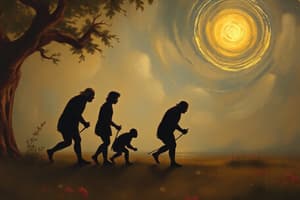Podcast
Questions and Answers
Match the following concepts in evolutionary biology with their definitions:
Match the following concepts in evolutionary biology with their definitions:
Natural Selection = Mechanism by which advantageous traits increase survival and reproduction Adaptation = Traits that improve survival in specific environments Speciation = Process through which new species arise Divergent Evolution = Different species evolve from a common ancestor
Match the evidence of evolution with their descriptions:
Match the evidence of evolution with their descriptions:
Fossil Record = Shows gradual changes and transitional forms between species Comparative Anatomy = Studying similar structures suggests common ancestry Molecular Biology = DNA and protein comparisons to trace evolutionary relationships Key Fossils = Specific fossils providing insights into human ancestry
Match the theories of evolution with their key ideas:
Match the theories of evolution with their key ideas:
Darwin's Theory = Proposes descent with modification from common ancestors Lamarckism = Suggests traits acquired during life can be inherited Modern Synthetic Theory = Combines natural selection with Mendelian genetics Sympatric Speciation = New species evolve from a single ancestor in the same region
Match the types of evolution with their characteristics:
Match the types of evolution with their characteristics:
Match the following figures in human evolution to their significant characteristics:
Match the following figures in human evolution to their significant characteristics:
Match the evolutionary patterns with their definitions:
Match the evolutionary patterns with their definitions:
Match the terms with their descriptions in evolutionary biology:
Match the terms with their descriptions in evolutionary biology:
Match the following key concepts with their significance in evolutionary biology:
Match the following key concepts with their significance in evolutionary biology:
Flashcards are hidden until you start studying
Study Notes
Evolutionary Biology
-
Definition: Study of the origins and changes in the diversity of life over time.
-
Key Concepts:
- Evolution: Process by which organisms change over generations through variations and natural selection.
- Natural Selection: Mechanism by which individuals with advantageous traits survive and reproduce more effectively.
- Adaptation: Traits that enhance survival and reproduction in specific environments.
-
Evidence of Evolution:
- Fossil Record: Shows gradual changes and transitional forms between species.
- Comparative Anatomy: Similar structures (homologous structures) in different species suggest common ancestry.
- Molecular Biology: DNA and protein comparisons reveal genetic similarities and evolutionary relationships.
-
Theories of Evolution:
- Darwin's Theory: Proposes descent with modification; species evolve from common ancestors.
- Lamarckism: Suggests organisms can pass on traits acquired during their lifetime (discredited).
-
Speciation:
- Allopatric Speciation: Formation of new species through geographic isolation.
- Sympatric Speciation: New species evolve from a single ancestor while inhabiting the same geographic region.
-
Evolutionary Patterns:
- Divergent Evolution: Different species evolve from a common ancestor.
- Convergent Evolution: Unrelated species develop similar traits due to similar environments or challenges.
-
Human Evolution:
- Hominids: Evolution of humans from primate ancestors, illustrating the branching tree of life.
- Key Fossils: Australopithecus, Homo habilis, Homo erectus, and Neanderthals provide insights into human ancestry.
-
Modern Synthetic Theory: Combines Darwin’s natural selection with Mendelian genetics to explain evolution.
-
Importance of Evolution:
- Understands biological diversity and the interconnections among species.
- Provides a framework for studying organisms' adaptations and behaviors in various environments.
Evolutionary Biology Overview
- Focuses on the origins and changes in life's diversity over time.
Key Concepts
- Evolution: Organisms undergo changes through generations via variation and natural selection.
- Natural Selection: Favorable traits lead to better survival and reproduction rates.
- Adaptation: Traits that improve an organism's chance of survival in its environment.
Evidence of Evolution
- Fossil Record: Displays gradual evolutionary changes and transitional forms connecting species.
- Comparative Anatomy: Homologous structures across species indicate a shared ancestry.
- Molecular Biology: Genetic material comparisons highlight similarities and evolutionary links among organisms.
Theories of Evolution
- Darwin's Theory: Proposes species evolve through descent from common ancestors with modifications.
- Lamarckism: Discredited view suggesting that acquired traits are genetically passed to descendants.
Speciation
- Allopatric Speciation: New species arise due to geographic isolation among populations.
- Sympatric Speciation: New species develop from a common ancestor while living in the same area.
Evolutionary Patterns
- Divergent Evolution: Different species evolve from a shared ancestor, adapting to distinct environments.
- Convergent Evolution: Unrelated species evolve similarities when faced with comparable environmental challenges.
Human Evolution
- Hominids: Traces human evolution from primate ancestors through a branched lineage.
- Key Fossils: Notable fossils include Australopithecus, Homo habilis, Homo erectus, and Neanderthals, providing direction on human ancestry.
Modern Synthetic Theory
- Integrates Darwin's natural selection with Mendelian genetics to provide a comprehensive understanding of evolutionary mechanisms.
Importance of Evolution
- Essential for comprehending biological diversity and the relationships between species.
- Offers insights into how organisms adapt and behave in varying environmental contexts.
Studying That Suits You
Use AI to generate personalized quizzes and flashcards to suit your learning preferences.




